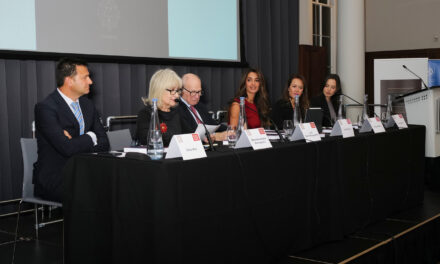London the soon-to-be Olympic capital can also claim to be the world capital of jaw-jaw about the future of journalism. Especially about the survival chances of something called “good” or “high-quality” or “investigative” journalism. What lies ahead for this endangered species: a slow death? a rapid death? a glorious future? or re-incarnation in new forms on the net? Opinions are sharply divided but everyone has a point of view.
Intelligence Squared staged an debate on the Future of News in central London on 24th March. It was discursive, since no formal motion had been proposed. But a strong cast of speakers all spoke their minds. Simon Jenkins, in the chair, suggested the key issue was whether the “economics of free” associated with the shift of the news media onto the internet was “killing serious journalism”. A good starting-point.
I found ten points in the ensuing discussion that shed light on the prospects for the future of news and journalism on the internet:
1. Andrew Neil: the UK has the most competitive and vibrant press in the world, and millions of Britons are still prepared to pay to hold hard copies of their chosen title in their hands. Consumers would be willing to pay to read stories in online editions of The Times and the Sunday Times, just as millions already do for the Wall Street Journal and the Economist. The end of the world of journalism is not nigh.
2. A.A. Gill: The Internet is an “e-box of nothing”. The economics of free was not and could not be serious journalism. And without investigative journalism parliamentary democracy could not work.
3. David Elstein: a big confusion in the journalism debate lies in the mixup in too many people’s minds between information and journalism. Press owners and editors made a great mistake by handing over their content to the “aggregators” like google which have earned fabulous riches by selling access to journalism done by others. Nick Davies’ “Flat Earth News” analysis had made people aware of a general decline in journalistic standards under the combined pressures of lack of time and resources. Yet the Daily Telegraph’s extended exposure of the MPs expenses scandal proved that the quality of serious journalism was “undiminished.”
4. Matthew Parris: News values will survive the means of transmission. The “chaff”, whether on the Internet or in print, would be blown away. News hierarchies that are good would win trust and survive, just as in the past. Sooner or later, those bloggers and solo artists who win a serious following on the web would pool their expertise, find an editor, and form something very like the successful model that we all know — the newspaper, news agency or magazine.
5. Claire Enders, a leading analyst of the media industry, warned about the real hollowing out of journalism that’s under way. The collective expertise of successful news organisations costs a great deal of time and money, and those resources are getting think on the ground. The logic was that “the big will get bigger”, but their numbers may be very few.. Meanwhile, new “blog experts” were successfully weaning sizeable followings away from journalists working in the conventional media. Tom Ricks in the US, a writer and reporter with a blog on ForeignPolicy.com, was one such example. But he’s an established name and Pulitzer-prize-winning journalist already. Anyway, will Britain necessarily go the way of America? It’s a moot point.- Representatives of new web-based news businesses, who live from the internet, believe of course in the wisdom of crowds. They also pay full respect to the textbook values of journalism; they emphasise the need for accuracy and added value, not just unsifted information, but they see a very different future. The key difference is that they want citizens themselves to choose the stories and believe that force is changing the whole news media landscape.
6. “The free model works”, said Jacob Weisberg, editor-in-chief of the Slate and other US websites. Examples include the participatioin of large numbers of people as bloggers, Twitter or other social network sites in China, Iran and Italy.
7. The logic of this deserves closer examination: he said a hundred staff and freelances were involved in producing Slate internet magazine “and we pay them”. So, how “free?”. Turi Munthe of Demotix, a citizen-journalism website and photo agency, made a case that countless bloggers and internet entrepreneurs were now cracking important stories, so breaking into what used to be the exclusive domain of the mainstream news outfits: bloggers in Egypt successfully exposing police brutality; WikiLeaks breaking stories through anonymous leaks. But Munthe acknowledged that “it’s hard for citizens to learn journalistic skills”, and the wholesale closure of foreign bureaus by traditional media titles was a bad omen for foreign coverage. Will that gap ever be filled by new-style websites like Demotix which boasts “over 12,000 contributors in over 170 countries?” That’s a very big ask. Watch this space.
8. Members of the audience put other very uncomfortable points to the barons and columnista of British journalism lined up in the Methodist Central Hall in Westminster: the “guild system” of journalism was a barrier to inquiry, inhibiting the mainstream media from speaking truth to power. The craft (or profession) of journalism might be doomed because many of the young generation no longer know what “real” news is or even what they may be missing if they never see it. They just expect to get it free. One member of the speakers’ panel mentioned the large number of what he called “asinine” comments that appear in response to online articles and blogs, by contrast with the Letters page of the nationals. Basic editing, really…
9. Matthew Parris said people should realise that journalists in Britain were fortunate. In large parts of the world journalists face constant danger from physical or legal attacks, or in all too many cases even murder, because of their work. No live and free journalists means no journalism.
10. Andrew Neil closed the debate with a bold definition of journalism — “to publish things that powerful people don’t want to hear.” But he gave this significant compliment to the bloggers: that their barbs, comments and sometimes corrections help to keep the journalists honest.




